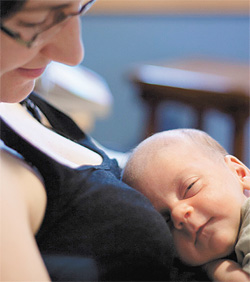Feeding schedule

![]() Whether you breastfeed or bottle-feed, it’s important to adapt to your baby’s appetite.
Whether you breastfeed or bottle-feed, it’s important to adapt to your baby’s appetite.
Over the first few days, most babies can’t distinguish between hunger and their need to suck. They want to be fed every time they wake up. Some babies, especially those with jaundice, may remain drowsy until they regain their birth weight and sometimes may forget to wake up to feed. They need to be stimulated, even during the night, to make sure they drink enough.
Keep in mind that newborn babies are in a period of intense learning. They must “learn” to feed, which is why they may need to feed longer and more often.
As the weeks and months pass, feeding frequency and duration, like sleeping patterns, may vary from one time or one day to the next. No two babies are the same. Some babies have a regular schedule, while others are more unpredictable. As your baby gets older, feedings tend to become shorter and less frequent.
Your baby’s schedule depends on a variety of factors:
- Age
- Appetite
- Temperament and mood
- How effective she is at sucking and the speed at which the milk flows
- The time of day
Breast milk is easy to digest since it is perfectly adapted to babies. Breastfed babies usually feed 8 times or more per day, especially during the first few months.
Most commercial infant formulas are made from cow’s milk. They take longer to digest because the baby’s stomach has to work harder. This is probably why babies fed on commercial infant formula tend to feed 6 or more times a day.
It’s hard to tell how many times your baby will feed per day; and it’s just as hard to know how much milk she will need each feeding.
Instead, you will have to learn to recognize signs that your baby is hungry or full. Let her drink when she shows signs of hunger, but don’t force her when she’s full in the hope that she will wait longer between feeds.
In the beginning, you may have difficulty understanding your baby’s needs. Is she hungry? Has she drunk enough? Is she crying because she’s uncomfortable and wants you to pick her up? If you get the impression that your baby is drinking too much or too little, your midwife or CLSC nurse may be able to help.


